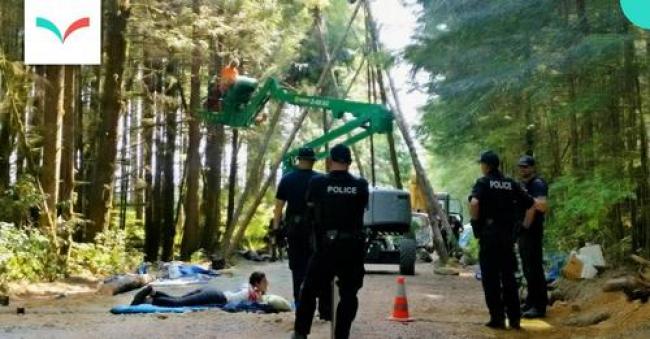Sept. 9, 2021
A year after groundbreaking old-growth report, government inaction still drives conflict in B.C.
Every day in B.C., irreplaceable groves filled with the oldest trees in the country are cut down and lost forever. In the year since the province’s strategic review of old-growth management, we’ve seen many promises but very little change in the forest.
Beginning in fall 2019, two veteran foresters undertook the most extensive review of forest policy ever done in the province. They submitted their findings to the government the next spring, which published them four months later, on September 11, 2020.
It’s a good report. Its call for a paradigm shift was a breath of fresh air after decades of governments insisting that all is well in the woods.
Among its specific recommendations is the deferral of logging in all at-risk old-growth forests in B.C. within six months. This deadline has long passed.
The provincial government has announced some deferrals in a few clunky stages, but they fall far short of the recommendation. The first round, announced with the report’s release, contains very little old-growth that is actually threatened. The vast amount of second-growth within the deferral areas remains open to logging as usual.
In communicating about this, the government intentionally misled the public, and a move intended to build goodwill further eroded public trust.
Since then, a handful of other old-growth areas have been deferred in Spuzzum Valley, the Central Walbran and Fairy Creek, thanks to Indigenous leadership. But the public understands that the old-growth crisis requires an end to the logging of all threatened ancient forests, not just limits in a handful of valleys.
The government’s rationale for its slowness is Indigenous rights. On the election debate stage last fall, Premier John Horgan said every tree in B.C. grows in the territory of a First Nation and protection of forests must be done with them.
This is true, and it’s a great standard. But it’s currently a double standard because that’s not what’s required for logging. Logging tenures have been established without Indigenous consent. While companies must consult nations on their cutting plans, they don’t need to receive a yes.
The B.C. NDP’s requirement of consent for conservation but not for logging has been rightly criticized as "ridiculous" by Indigenous leaders.
Many First Nations have a stake in logging in their territory. But far from their rightful place as decision-makers, their role is too often limited to revenue-sharing agreements. In these agreements, nations receive some of the money generated by logging. These deals can mean a lot, especially in remote communities, as they provide needed revenue and sometimes other benefits like jobs.
After hundreds of years of having their resources stolen and territories degraded, few First Nations are in a position to turn down sources of revenue. But this is the unfair choice the B.C. government is forcing on communities. This approach is infuriating to me as a settler here because it pretends that colonialism didn’t happen and isn’t continuing today.
Substantial funding to support nations and ensure choosing deferrals doesn’t mean a loss of revenue has been called for repeatedly by the Union of British Columbia Indian Chiefs (UBCIC), among others. So far, not a single dollar has been earmarked for this purpose by the B.C. NDP government.
Permanent protection of old-growth requires nation-to-nation negotiation and the return of land to Indigenous Peoples. This process will take a lot of work and time.
But time is what old-growth forests don’t have. In the year after the old-growth strategic review, the number of permits for old-growth logging actually increased.
The review panel called for deferrals to provide breathing room for conversations. Their report frames deferrals as a starting point, not the final outcome. The government has torqued this, insisting deferrals take months if not years, while status quo logging continues in the meantime.
Public outrage grows, with the blockades around Fairy Creek set to become the largest act of civil disobedience in Canadian history. The B.C. NDP’s “talk and log” approach is the root cause.
There are a few bright spots.
Nations like the Squamish, Kwakiutl, Tla’amin and Nuxalk have called for deferrals in their territories. The UBCIC has again demanded the government move faster, recognizing delayed deferrals threaten our ability to accomplish the needed paradigm shift. In June, the province announced the formation of a technical panel of scientists to guide its deferral process.
But, nothing indicates Horgan and the B.C. NDP government truly grasp the urgency here.
A year after the old-growth report came out, the at-risk old-growth forests it said should be set aside within six months continue to be cut down and lost forever. Promises to do better are fine, but the only score that matters is the one kept in the woods.
And when it comes to actually protecting old-growth forests in B.C., the NDP is failing.

